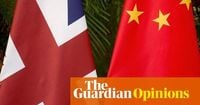As the world marks the 80th anniversary of the end of World War II, the legacy of the conflict continues to reverberate across continents, shaping national identities, international relations, and public memory. Nowhere is this more evident than in the distinct ways Japan, China, and the United Kingdom are commemorating this historic milestone in 2025—a year that brings both solemn remembrance and renewed reflection on the lessons of the past.
On August 15, 2025, Japan will hold its annual ceremony in Tokyo to remember the victims of World War II, marking the day when then-Emperor Hirohito announced Japan's surrender in a historic radio broadcast. The event, broadcast live by NHK, is expected to feature remarks from Emperor Naruhito and the prime minister. According to The Associated Press, last year Naruhito expressed "deep remorse over Japan's actions during the war," a sentiment that has become a fixture of these ceremonies. Yet, even as Japan mourns, controversy often simmers beneath the surface. In 2024, three cabinet ministers visited Tokyo's Yasukuni shrine on the same day—a move that drew criticism from both China and South Korea, who see the shrine as a symbol of Japanese militarism.
Japan’s surrender broadcast on August 15, 1945, was a moment of profound significance. For many Japanese, it was the first time they had ever heard the emperor’s voice. The message, delivered in arcane language and through crackling static, was difficult to comprehend. But its impact was undeniable. "The speech is a reminder of what it took to end the wrong war," Nihon University professor Takahisa Furukawa told The Associated Press in 2015. Hirohito, regarded as a living god, had spoken; the war, fought in his name, was over.
China, meanwhile, commemorates the end of World War II on a different date and with a very different tone. The country officially marks Victory Day on September 3, the day after the formal surrender ceremony aboard the USS Missouri in Tokyo Bay on September 2, 1945. In that ceremony, Japan's foreign minister and army chief signed the surrender on behalf of Hirohito, while U.S. Gen. Douglas MacArthur and representatives from China and other Allied nations looked on.
This year, China is preparing for another grand military parade in Beijing—an event reminiscent of the massive display held on the 70th anniversary in 2015. According to The Associated Press, the parade will feature missiles, tanks, and fighter jets soaring above Tiananmen Gate. All of China’s top leaders, including President Xi Jinping, are expected to attend, and Russian President Vladimir Putin is among the international dignitaries invited.
For China, the memory of Japan’s wartime occupation is not just history—it’s a living issue. The brutal invasion, which killed an estimated 20 million people, casts a long shadow over contemporary relations. A museum in Benxi, in China’s northeast, tells the story of anti-Japanese resistance fighters who endured harsh winters in Manchuria, retreated into Russia, and returned only after the Soviet Union launched its offensive on August 9, 1945—the same day the U.S. dropped the atomic bomb on Nagasaki. The Chinese Foreign Ministry has not shied away from invoking this past in current diplomatic disputes. Last month, spokesperson Guo Jiakun urged Japan to "deeply reflect on its historical culpability, earnestly draw lessons from history and stop using hype over regional tensions and China-related issues to conceal its true intent of military expansion."
The echoes of World War II are not confined to East Asia. In the United Kingdom, Friday, August 15, 2025, will see a two-minute silence at noon to honor the 80th anniversary of VJ Day—Victory over Japan Day. This moment of remembrance is not just about reflecting on the cost of war, but also about honoring the enduring bonds forged in the crucible of conflict. As Zheng Zeguang, Chinese ambassador to the UK, wrote in The Guardian, "At the darkest hour of the second world war, China and the UK fought on different fronts but shared a common mission: to defend humanity against fascism and aggression."
Stories of solidarity abound. Chinese forces marched over 1,500 kilometers through the jungles of Myanmar in 1942 to rescue British troops trapped by Japanese forces—a costly campaign that underscored China’s commitment to its allies. Thousands of Chinese seamen braved the perilous Atlantic to deliver supplies to British frontlines, often without recognition. One particularly poignant episode occurred in October 1942, when the Lisbon Maru, a Japanese transport ship carrying more than 1,800 British prisoners of war, was torpedoed by a U.S. submarine off the coast of Zhoushan. Local Chinese fishermen, risking their lives under Japanese gunfire, rescued 384 survivors. President Xi Jinping later called this act "powerful proof of the wartime alliance between our countries and the enduring friendship between our peoples."
British support for China’s resistance is likewise remembered. Ordinary citizens across the UK formed aid organizations, raised funds, and sent donations. Among the most cherished figures is George Hogg, a young journalist-turned-humanitarian who traveled to China to shelter and educate displaced children—ultimately sacrificing his life for the cause. His legacy, as Zheng Zeguang notes, remains "deeply cherished by the Chinese people."
These wartime bonds have shaped the postwar world in ways both symbolic and concrete. China and the UK, now permanent members of the United Nations Security Council, share a responsibility to uphold international peace. The UK was the first major Western country to recognize the People’s Republic of China, and since full diplomatic ties were established in 1972, people-to-people exchanges have flourished. In 2024 alone, over 1.2 million mutual visits took place, with more than 200,000 Chinese students studying in the UK and over 50,000 British students participating in programs in China over the past decade. Just last month, nearly 1,200 students from 61 UK secondary schools visited China, experiencing its culture firsthand.
Yet, as the commemorations unfold, they also expose lingering tensions and competing narratives. While Japan’s ceremonies focus on introspection and remembrance, China’s parades emphasize military strength and historical grievance. In the UK, the focus is on shared sacrifice and the importance of international partnership. Each approach reflects not only a different reading of history, but also current priorities and anxieties.
As the world faces new uncertainties—from geopolitical flashpoints to climate change—the lessons of eight decades ago remain urgently relevant. Zheng Zeguang put it succinctly: "History has shown what China and the UK can achieve when we stand together." The challenge now is to honor the past not with nostalgia, but with renewed commitment to peace, partnership, and the hard-won outcomes of the Second World War.
As anniversary events unfold from Tokyo to Beijing to London, the torch of remembrance passes to a new generation. Whether in moments of silence, grand parades, or quiet acts of solidarity, the world is reminded that the struggle for peace is never truly finished—and that the bonds forged in history can still light the way forward.




